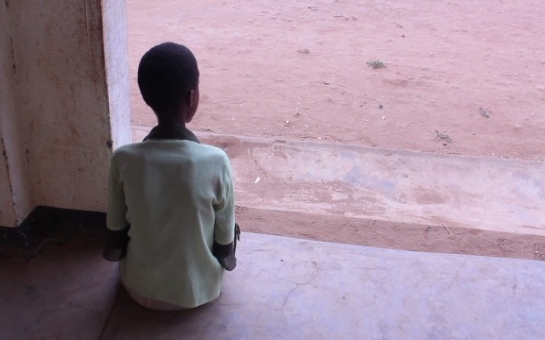"We were happy, because we didn't know what was there," she said.When she got there, the messages she heard stunned her."You should sleep with a man and get rid of child 'dust.' If you don't do it, your body will get diseased."A demonstration involved one girl lying down, with one of the older women on top."You should be dancing and have a man on top of you, making him happy," she was told.At age 10, Grace was being taught how to have sex."Fueling child marriage"Like the other girls in the village, Grace had been sent to camp with her family's blessings. Neither trafficked nor forced to work in the sex trade, she was attending a time-honored ritual passed through generations."Everyone makes sure their child goes to initiation ceremony because you will not be accepted in the community," said Jean Mweba, an education program specialist for reproductive health and adolescent health at the United Nations Population Fund. "It's an issue of being accepted in the community."Boys and girls attend separate camps, serving as a forum where adults pass on their community-held attitudes and beliefs about sexuality and adulthood.Not all initiation ceremonies in Malawi encourage girls to have sex, as programs and local cultures vary throughout the diverse country, which is home to several ethnic groups and languages.Pockets exist throughout the country, especially in the south, that teach sexually explicit content to their youth. Initiations that encourage premarital sex are practiced among various ethnic groups, including the Yao and Lomwe, which are based in the south, according to Malawi Human Rights Commission, which is charged with investigating rights violations.The commission also reported that girls as young as six have been sent to initiation camps, where they're taught how to have sex. It condemned the sexual curriculum for young girls, saying it impinges "on a number of rights of the girl child such as the right to education, the right to health, and the right to personal liberty and dignity."Human rights groups and researchers have also found instances when a man, nicknamed a hyena or fisi, has sexual intercourse with newly initiated girls as part of the rite of passage. Men enter the girls' room, one woman told a focus group which was held for teens and adults by the Johns Hopkins University Bloomberg School of Public Health researchers to examine perspectives on initiation rites."They say they want to see whether the girls have really grown up by having sex with them," she was quoted as saying, in the study published in the journal AIDS CARE in 2012."Not only that, the hyena doesn't wear protection, which is why I know girls who contracted HIV because of hyenas," said Joyce Mkandawire, the communications advisor at Girls Empowerment Network Malawi, a young women's rights organization.In Malawi, over 10% of the population between the ages of 15 and 49 have HIV/AIDS, according to national data."There's no benefit to the sex education," said Mkandawire. "This is harmful to the girls. This is one of the factors fueling child marriage in Malawi. Why teach girls this when they're nine or 10 years old?"Toll on girlsMalawi ranks 10th for the highest rate of child marriages in the world, with half of its children married before the age of 18, according to the World Health Organization. The country also suffers one of the world's highest maternal mortality rates, according to UNICEF. And 35% of all pregnancies in Malawi come from teenage mothers.The younger the girls, the more they are at risk for pregnancy-related problems such as fistulas -- a condition that results in leaking urine and feces -- bleeding and other complications.But none of this was mentioned at the camp, Grace said.For the most part, discussions about what happens at initiation camps are scarce."You don't talk to anyone -- even your mother," said Naomi Nkhonjera, a project officer with the group, Girls Empowerment Network Malawi. "You can't talk about the secrets."The girl who said noGrace, a diminutive girl in pink jelly sandals, is one of the few girls willing to talk about her experience at initiation camp. Now 15, she spoke with a group of journalists visiting Malawi with the United Nations Foundation.Her initiation camp took place not far from her home. They stayed there for a week, Grace said. The women leading the camp taught her about respecting her elders and doing household chores, but also how to have sex.The women demonstrated sexual positions. Then, they encouraged girls to do "sexual cleansing," also called kusasa fumbi, which meant they should get rid of their inexperience with sex by practicing. They told her if she didn't, she'd get a skin disease.There was no discussion about the risks of pregnancy, sexually transmitted diseases or how to protect herself, Grace said."I was not happy," she said. "From the time I came out from camp, they were saying I should go for sexual cleansing."When her friends urged her to practice, Grace stayed home. She didn't want to participate.Girls often say in private that they hated the sexually explicit lessons, said Harriet Chanza, a national professional officer for family health and population at the World Health Organization."They have no choice," she said. "They are forced by their parents and guardians to go through those things. If anyone refuses, they would definitely be looked at as an outcast. There is a lot of peer pressure."Despite the peer pressure, Grace resisted and did not go through the so-called "sexual cleansing." She learned the risks associated with unprotected sex from Girls Empowerment Network, a local girls' group that works to prevent childhood marriages and pregnancies."You can get pregnant, you can get HIV, so it's not good for us," she said.Grace has little interest in practicing what she learned at initiation, or marriage, for now."When I finish my education, I'll get married," she said.Incremental changesEchoing many girls' advocates, initiation camps aren't inherently problematic, said Henry Chimbali, spokesman for Malawi's Ministry of Health."We are aware that not all cultural practices require stopping but some need modification to accommodate modern and important health practices," he said.He said the ministry has issued a cultural practices manual to eliminate "harmful cultural practices," collaborated with local leaders as well as established outreach programs to keep children in school as well as have access to health services.In recent years, there have been improvements in indicators of early pregnancies, hospital delivery, reduced incidences of sexually transmitted infections, Chimbali said. "We cannot be sure to say that this is a direct contribution of the efforts on confronting harmful cultural practices, but we can confidently say that there is indeed a significant contribution towards this progress."In Malawi, traditional authorities and chiefs hold power in local government and are the perceived custodians of local culture.Girls rights advocates have tried to persuade such local tribal leaders to change the way initiation camps incorporates sexual content. In Chiradzulu, the district where Grace resides, girls advocates convinced officials to review and remove the sexual content of initiation camps.Grace now goes to initiation camps to talk to other girls about the risks involved in early sexual activity.It's progress, Mkandawire says. "But this is just one community we have reached."(CNN)ANN.Az
A rite of passage that pushes girls into sex
Society
09:30 | 06.02.2014

A rite of passage that pushes girls into sex
When Grace learned she'd be going to a camp with her friends, she was thrilled. Every girl around her age in her southern Malawi village would attend the rite of passage, known as an initiation camp. They counted down to what seemed like summer camp.
Follow us !










